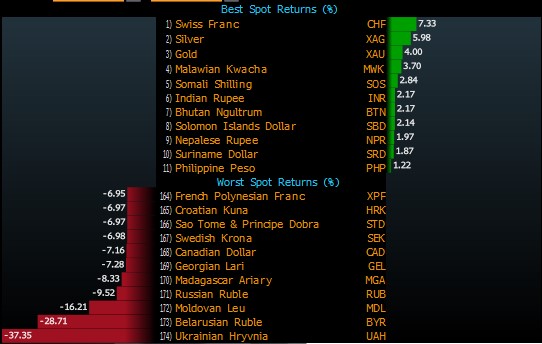Click Here for this Week's Full Letter - February 10, 2015
Greetings,
Economists have debated for several years whether or not Europe is becoming the next Japan. Japan famously fell into a self-perpetuating deflation in the 1990s, with falling prices leading consumers and businesses to delay spending, thus keeping growth weak. However, if you were to ask Angela Merkel or Francois Hollande whether they’d rather have Europe become the next Japan or the next Ukraine – they’d take Japan every time.
Ukraine’s currency lost more than 20% of its value against the US dollar last Thursday after the country’s central bank raised interest rates 5.5% and moved towards a free-floating exchange rate. The government’s foreign-currency and gold reserves hit a 10-year low of $6.4 billion in January. The military budget alone is $3.2 billion for 2015.
President Petro Poroshenko is now looking for cash from the IMF and weapons from the US, but the currency crisis is spreading beyond Ukraine’s borders. Less than six weeks into the New Year, 7 of the world’s 10 worst performing currencies come from Eastern Europe.
YTD Currency Returns
In the grand scheme of things, devaluing the Moldovan Leu or Belarusian Ruble won’t have much impact on the broader economy, but as contagion expands from the Ukrainian epicenter, it could hurt systemically important economies like Poland, Hungary or Turkey.
Obviously these currencies are under pressure because of Russia’s incursion into Ukraine. Therefore, it’s a little alarming Greece’s new Prime Minister, Alex Tsipras, is cozying up to Vladimir Putin. Greece, a member of NATO, is still trying to restructure its debt burden, and knows the threat of increased Russian influence might lead to concessions. It’s a risky gamble, but EU leaders are playing hardball. Following talks with his Greek counterpart, German Finance Minister Wolfgang Schauble told reporters the two have “agreed to disagree.” Later in the press conference, the Greek Finance Minister offered a contradiction, saying the pair had not even managed that much.
The Cup & Handle Fund was down less than 1% last week, due to some hedges outweighing the directional exposure. We’re still up ~10% since inception and patiently waiting; not much new to report on that end. The US employment data was unambiguously strong, with USD being the main beneficiary. After stalling in January, the DXY index looks ready to resume its upward trend and I’m interested to see if this causes some EM equity markets to breakdown. Nothing yet, but it seems destined to happen eventually. I’m still working on the February investment letter, which will hopefully be in your inbox next Monday – if you’d like to start receiving these letters click here.
Today’s letter will cover several topics, including:
- Beijing’s Burden
- Bull Market in Balance Sheets
- Portfolio Security
- Chart of the Week
With that, I give you this week's letter:
February 10, 2015
As always, if you have any questions or comments or just want to vent, please send me an email at mike@cup-handle.com.
Until next time, tread lightly out there,
Michael Lingenheld
Managing Editor – Cup & Handle Macro
Recent free content from Michael Lingenheld
-
 The Finale - April 21, 2016
— 4/20/16
The Finale - April 21, 2016
— 4/20/16
-
 The Spring Freeze - April 6, 2016
— 4/05/16
The Spring Freeze - April 6, 2016
— 4/05/16
-
 Dependent on Friday's Data - March 30, 2016
— 3/29/16
Dependent on Friday's Data - March 30, 2016
— 3/29/16
-
 Money For Less Than Nothing - March 23, 2016
— 3/22/16
Money For Less Than Nothing - March 23, 2016
— 3/22/16
-
 Avoid the Crowds - March 16, 2016
— 3/15/16
Avoid the Crowds - March 16, 2016
— 3/15/16
-
{[comment.author.username]} {[comment.author.username]} — Marketfy Staff — Maven — Member


